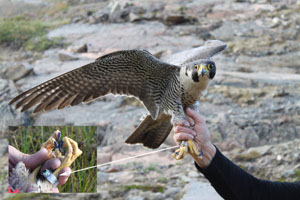|
The research is sponsored by:
|
Fieldwork
The 2024 fieldwork is schedueled to take place July 16 - August 8.
The fieldwork is a continuation of a survey program including 12 selected peregrine sites. The fieldwork will be concentrated on collecting information on productivity, territory occupation, banding of nestlings, prey selection and phenology.
In addition, we will collect data and samples to further investigate the falcon's response to climatic change and their loads of persistent organic pollutants.
 In 2012, as a new addition to the project, a number of breeding females had data loggers attached to their rings (see photo).
The data loggers can with great precision register the light intensity throughout the day over a period of 2-3 years and store the data until they can be retrieved.
In 2013 and 2014 we expect to deploy additional dataloggers and also to harvest the first data from the dataloggers deployed in 2012.
The collected data will make it possible to determine the geographical location twice a day (midday and midnight) with a precission better than 100 km.
This part of the work is carried out in cooperation with Canadian and U.S. peregrine researchers and includes studies of peregrines
of the same subspecies (F. p. tundrius) from its easternmost (Greenland) to its westernmost (Alaska) breeding areas,
thus making it possible to do a complete analysis of the subspecies migration and wintering habits.
In 2012, as a new addition to the project, a number of breeding females had data loggers attached to their rings (see photo).
The data loggers can with great precision register the light intensity throughout the day over a period of 2-3 years and store the data until they can be retrieved.
In 2013 and 2014 we expect to deploy additional dataloggers and also to harvest the first data from the dataloggers deployed in 2012.
The collected data will make it possible to determine the geographical location twice a day (midday and midnight) with a precission better than 100 km.
This part of the work is carried out in cooperation with Canadian and U.S. peregrine researchers and includes studies of peregrines
of the same subspecies (F. p. tundrius) from its easternmost (Greenland) to its westernmost (Alaska) breeding areas,
thus making it possible to do a complete analysis of the subspecies migration and wintering habits.
Interactive map of prejectarea. Show large map.
|